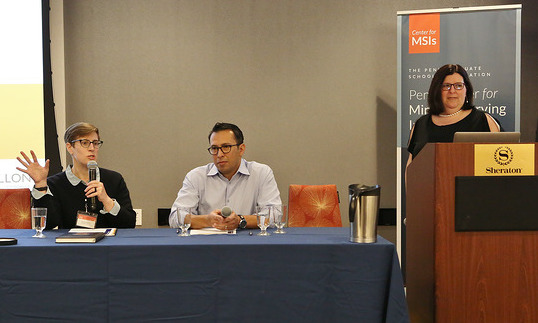Building on-ramps into academia for Hispanic students
It made no sense to Marybeth Gasman, the Judy & Howard Berkowitz Professor of Education and Director of the Penn Center for Minority Serving Institutions, that graduate programs bemoaning the lack of minority candidates for their programs looked for them only in the same spaces over and over – mainly a small subset of highly selective colleges and universities with little track record for enrolling a diverse student class or sending them to graduate school. The scarcity of Latino professors is especially stark, as Latinos make up only 4.1 percent of the professoriate in the United States, but 20 percent of the population aged 18–44.

CREATING NEW POSSIBILITIES
The dividends of “HSI Pathways to the Professoriate” were already evident this month with a three-day Cross Institutional Conference, which gathered nationally-known speakers, 30 HSI humanities students, and mentors from the universities that are deeply engaged in nurturing new scholars and creating new possibilities in research. These student fellows attended with their HSI faculty mentors, as well as mentors from a majority research institution. Every fellow presented their research through a performative piece, such as a documentary or a poem. Fellows also took questions from the audience.
Gasman said, “Students really rose to the challenge. I was impressed with the level and quality of their work – these students are producing graduate level research already.”
While the involved HSIs were excited by the opportunities being created for these students, perhaps the biggest surprise has been the rippling effects at their own institutions.
“What is key to this program is not only changing the lives of individual students, but making institutional change,” added Heidi Schumacher, HSI Pathways Coordinator at California State University, Northridge. “The program gives us an opportunity to better understand the barriers there are for our students, while giving graduate programs the opportunity to dismantle some of the barriers in their own schools.”
DISMANTLING BARRIERS
Part of the weekend was also making all participants aware of where “leaks” in the pipeline of Latino scholars can occur, and arming them with the knowledge to overcome these challenges. The kick-off keynote featured Mildred Garcia, president of the American Association of State Colleges and Universities, on “The Urgency of Latino/a Faculty in Higher Education.” Panel discussions on maximizing the students’ first year of graduate school, taking care of one’s mental health, and writing and publishing in academe, were among the subjects discussed. Speakers ranged from Catherine Good of Baruch College of City University on “Overcoming Stereotype Threat” – a talk peppered with the latest brain science – to Penn Dean John Jackson making the case that multimodal research is relevant to discussions of inclusion in higher education.
“The workshops were designed to help the fellows – 21 of whom are first-generation college students – to not only succeed in graduate school, but to also make sure they are preparing for the academic job market,” said Castro Samayoa, now a Penn GSE alumnus, Assistant Director for Assessment at CMSI, and an assistant professor at Boston College.
“We want to be sure nothing surprises these fellows in the process of becoming faculty,” Castro Samayoa said. “If they know what to expect, they can better prepare for it.”
The second cohort of 30 HSI Pathways fellows was named in February 2018. This cohort, like the cohort before them, will receive mentoring and support in the graduate school process and upon entering Ph.D. programs. Each fellow will also participate in a six-week summer research program and attend a Cross Institutional Conference where they are encouraged to present their work.
During the five-year program, CMSI is partnering with three Hispanic Serving Institutions – Florida International University; the University of Texas El Paso; and California State University, Northridge – and five majority research institutions – New York University; University of California, Berkeley; University of Pennsylvania; Northwestern University; and University of California, Davis.
